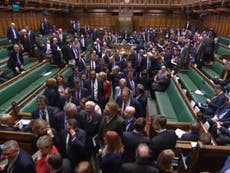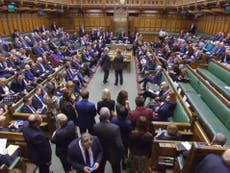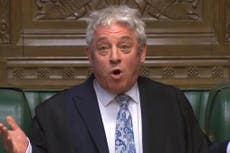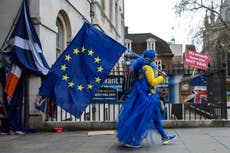Theresa May has kicked the Brexit can so far down the road it's not even on the same street anymore
The House of Commons now looks like that nest of obsolete cables you’ve moved house with three times – and is about as much use

And there, at the end of the road at the end of the world, our heroine stands. We see her from behind, a silhouette against a wide horizon. Her eyes fix on the can at her feet, a speck of nothing, there on the asphalt, at the foot of a brick wall as high and wide as the observable universe.
This is it. She clears her throat. She tries to speak but no sound comes out. She takes a short run up. A clean hit, the can accelerates and the world is changed forever.
Swoosh!
What’s this? The brick wall billows before her like a pond beneath a stone. It falls to the ground like a theatre curtain. Her eyes widen. The strings crescendo. And there, right there before her, what’s this?
It’s more road. More road! It was there all along! More road! We’re saved! We’re saved! There’s enough road here to keep us going for a month or more. Maybe three. And who’s to say there won’t be more road after that?
We can kick this can forever. Forever!
And that, if you’re prepared to add in a cast of around 649 non-entities and around four hours of terrible dialogue, is exactly what happened in the House of Commons on Thursday afternoon, the latest episode of your favourite drama: Brexit, which is kind of like Eldorado but with a £40bn budget.
Brexit, and our Brexit prime minister, took a long look at the end of the road, and decided the only way out was to find more road behind it.
The Commons voted by more than a hundred votes in favour of extending Article 50. No one knows for quite how long, nor even if the EU will allow it. It could be a matter of weeks, it could be a matter of months. Already leading figures in the EU, and they’re the ones who traditionally tell the truth in this drama, have suggested the UK might be staying in for 21 months or more.
Naturally, it couldn’t happen without the traditional spectacle of cross party self-knot-tying, with the Commons now very much resembling that nest of obsolete cables you’ve moved house with three times, and precisely the same amount of use.
Theresa May has, for the record, told the Commons more than a hundred times that the UK “will be leaving the EU on 29 March”. In fact, it might very well be that Thursday was the only time since becoming prime minister that she has come into the Commons and not said those words.
And yet, here she was, wandering through the division lobbies, voting for an extension. She managed to persuade 112 of her MPs to do the same. She has been saved by Jeremy Corbyn’s Labour Party, which if you’re the world’s most embarrassingly stereotypical home counties Tory and not, say, a revolutionary Marxist, could be considered a touch embarrassing.
Just like the day before, large numbers of her cabinet voted in the opposite direction, including, just for laughs, her own Brexit secretary Stephen Barclay. It was he who closed the debate on the motion on May’s behalf. Then he went and voted against it.
It will be, in theory, his job to go to Brussels and negotiate for the extension he has just voted against.
Another to vote against the motion was Theresa May’s own chief whip, Julian Smith. He’d had a busy day on his hands, by the way, which means we must with some reluctance return to one of the earlier votes. On that occasion, via an amendment tabled by Labour’s Hilary Benn, the house was being asked to vote on whether to let backbenchers, and not the government, take control of the Commons order paper.
If you’re not one for technicalities, what that means is essentially the Commons voted on whether to not have a government anymore. The government won that one, 314 to 312. When that was read out, Smith and his deputy, Chris Pincher, leaned over the front bench for fist bump of such intensity it can only be measured on the Benn-Eubank scale.
A quick word on the size of that victory. To keep your government going by two votes means that you only require two MPs to change their minds and that’s your lot.
Among those, who chose to abstain? Labour’s Fiona Onasanya, who became the historic first MP to vote while wearing an electronic tag, and the sage of Sheffield Hallam, Jared O’Mara.
Still, two votes short of her own demise, May vanished at the end, sneaking out behind the speaker’s chair. She had come within a whisker of that being all but that, and yet she had not a single word to utter about what happens next.
That new road looks inviting, for the time being, but it’s a lot more dangerous than the one she travelled to get here.








Join our commenting forum
Join thought-provoking conversations, follow other Independent readers and see their replies